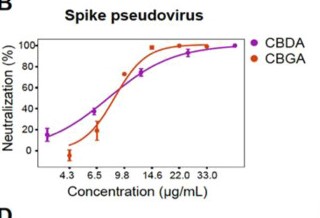One of the top dangers of COVID-19 is the inflammation that arises from the infection. Many people don’t realize that different comorbidities can put them in danger of severe COVID infections. [1] Diseases such as diabetes, heart disease, and autoimmune issues increase the risk of inflammation throughout a person’s body.
Getting inflammation under control and controlling the cause of the inflammation are two of the best ways to help your body be healthy and fight off infections and diseases. Cannabidiol (CBD) and terpenes are proven to reduce inflammation. In some of the latest research, CBD and terpenes work better than standard corticosteroids to reduce the specific inflammation for COVID, known as the cytokine storm (check out Susan Trapp, Ph.D.’s article in this issue of T&T). [2]
Eybna’s NT-VRL-1 Terpene Formula and CBD Versus COVID-19
The team at Eybna, for example, published data in 2021 on their novel NT-VRL-1 terpene formulation which contained beta-caryophyllene, eucalyptol, and citral, amongst many other terpenes. [3] When CBD was added to this blend, the CBD potentiated the antiviral effects. Interestingly, the authors report that the introduction of the formulation with host cells prior to infection with the virus led to the antiviral effects, and they hypothesize that this may be due to the prevention of the virus from binding to or going into the cells.
This is excellent news for people with autoimmune issues and other comorbidities because CBD can open up safer and less life-altering therapies. Additionally, CBD may be an adjunct therapy to help prevent infection and reduce inflammation in those who do become infected.
CBDA and CBGA Block Cellular Entry of SARS-CoV-2 and the Emerging Variants
Another study is showing a huge breakthrough. [4] Cannabigerolic acid (CBGA) and cannabidiolic acid (CBDA) derived from hemp prevented the infection of human epithelial cells by a pseudovirus expressing the SARS-CoV-2 spike protein and prevented the entry of live SARS-CoV-2 into cells. You may have heard about the spike protein before because that’s what one of the vaccines is based on. The study authors also discuss the “virus neutralization” capacities of CBGA and CBDA, again pointing to the cannabinoids abilities to block the virus from entering the host cells.
The study was not conducted in humans but an assay that replicated human-like conditions, so more research on humans is required. The researchers, however, optimistically reported that “Orally bioavailable and with a long history of safe human use, these cannabinoids, isolated or in hemp extracts, have the potential to prevent as well as treat infection by SARS-CoV-2.” What’s more, the authors indicate that other cannabinoids in cannabis extracts may act individually against SARS-CoV-2, which may augment the effectiveness of individual cannabinoids, providing another example of ensemble effects between molecules within the cannabis plant.
These studies offer promise, again highlighting how molecules within cannabis can help us in profound ways. That is not to say, however, that you should stop all other safety measures, such as washing your hands, using a mask, and maintaining proper social distancing. Also, it’s worth speaking with your doctor about your interest in medicinally utilizing cannabinoids and terpenes, and to determine any potential interactions with medications. While many doctors may frankly not know how cannabinoids and terpenes may interact with some medications since this line of research is still burgeoning, we need to continue to push this conversation into the healthcare domain.
References
[1] Honardoost M, Janani L, Aghili R, Emami Z, Khamseh ME. The sssociation between presence of comorbidities and COVID-19 severity: A systematic review and meta-analysis. Cerebrovasc Dis. 2021;50(2):132-140. doi: 10.1159/000513288[2] Tisoncik JR, Korth MJ, Simmons CP, Farrar J, Martin TR, Katze MG. Into the eye of the cytokine storm. Microbiol Mol Biol Rev. 2012;76(1):16-32. doi:10.1128/MMBR.05015-11
[3] Chatow L, Nudel A, Nesher I, et al. In vitro evaluation of the activity of terpenes and cannabidiol against human coronavirus E229. Life (Basel). 2021;11(4):290.
[4] van Breemen RB, Muchiri RN, Bates TA, et al. Cannabinoids Block Cellular Entry of SARS-CoV-2 and the Emerging Variants. J Nat Prod. 2022;85(1):176-184. (Image taken from Figure 3 in study)









